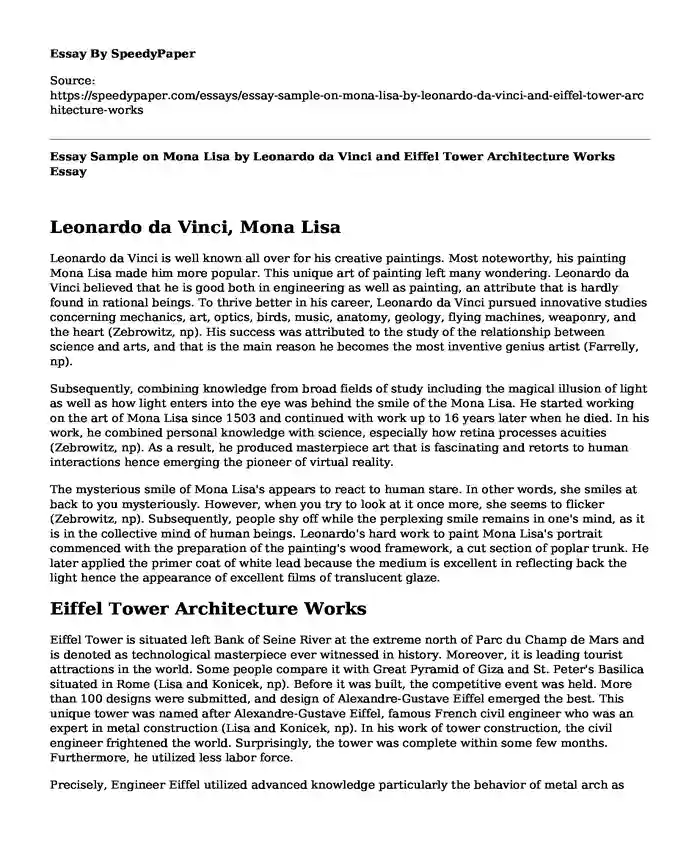
| Type of paper: | Essay |
| Categories: | Architecture Art |
| Pages: | 3 |
| Wordcount: | 646 words |
Leonardo da Vinci, Mona Lisa
Leonardo da Vinci is well known all over for his creative paintings. Most noteworthy, his painting Mona Lisa made him more popular. This unique art of painting left many wondering. Leonardo da Vinci believed that he is good both in engineering as well as painting, an attribute that is hardly found in rational beings. To thrive better in his career, Leonardo da Vinci pursued innovative studies concerning mechanics, art, optics, birds, music, anatomy, geology, flying machines, weaponry, and the heart (Zebrowitz, np). His success was attributed to the study of the relationship between science and arts, and that is the main reason he becomes the most inventive genius artist (Farrelly, np).
Subsequently, combining knowledge from broad fields of study including the magical illusion of light as well as how light enters into the eye was behind the smile of the Mona Lisa. He started working on the art of Mona Lisa since 1503 and continued with work up to 16 years later when he died. In his work, he combined personal knowledge with science, especially how retina processes acuities (Zebrowitz, np). As a result, he produced masterpiece art that is fascinating and retorts to human interactions hence emerging the pioneer of virtual reality.
The mysterious smile of Mona Lisa's appears to react to human stare. In other words, she smiles at back to you mysteriously. However, when you try to look at it once more, she seems to flicker (Zebrowitz, np). Subsequently, people shy off while the perplexing smile remains in one's mind, as it is in the collective mind of human beings. Leonardo's hard work to paint Mona Lisa's portrait commenced with the preparation of the painting's wood framework, a cut section of poplar trunk. He later applied the primer coat of white lead because the medium is excellent in reflecting back the light hence the appearance of excellent films of translucent glaze.
Eiffel Tower Architecture Works
Eiffel Tower is situated left Bank of Seine River at the extreme north of Parc du Champ de Mars and is denoted as technological masterpiece ever witnessed in history. Moreover, it is leading tourist attractions in the world. Some people compare it with Great Pyramid of Giza and St. Peter's Basilica situated in Rome (Lisa and Konicek, np). Before it was built, the competitive event was held. More than 100 designs were submitted, and design of Alexandre-Gustave Eiffel emerged the best. This unique tower was named after Alexandre-Gustave Eiffel, famous French civil engineer who was an expert in metal construction (Lisa and Konicek, np). In his work of tower construction, the civil engineer frightened the world. Surprisingly, the tower was complete within some few months. Furthermore, he utilized less labor force.
Precisely, Engineer Eiffel utilized advanced knowledge particularly the behavior of metal arch as well as metal truss form on loading such as those of wind forces. Subsequently, his research opened new revolution in architectural design and civil engineering. Afterward, the tower justified itself aesthetically despite few attempts to bring it down. It is exceptionally light weighing about 7300 metric tons because it is made of puddled iron. Remarkably, the four pillars that support the tower are aligned to the points of the compass so that an individual might use the tower as a reference to locate places within Paris. Media such as radio and television advertisements made the tower gain further significance as a transmission tower. Furthermore, the tower is the tallest building in Paris measuring approximately 1069 feet higher (Lisa and Konicek, np). In conclusion, the glass-cage machines engineered by Otis Elevator Company in the U.S help guests climb up the tower.
Works Cited
Farrelly, Lorraine. The fundamentals of architecture. Bloomsbury Publishing, 2017.
Lisa, Steven G., and Jeffrey C. Konicek. "System, methods and applications for embedded internet searching and result display." U.S. Patent No. 9,582,580. 28 Feb. 2017.
Zebrowitz, Leslie. Reading faces: Window to the soul?. Routledge, 2018.
Cite this page
Essay Sample on Mona Lisa by Leonardo da Vinci and Eiffel Tower Architecture Works. (2022, Jun 14). Retrieved from https://speedypaper.com/essays/essay-sample-on-mona-lisa-by-leonardo-da-vinci-and-eiffel-tower-architecture-works
Request Removal
If you are the original author of this essay and no longer wish to have it published on the SpeedyPaper website, please click below to request its removal:
- Free Essay Sample on Personal Effectiveness
- Free Essay Dedicated to Information System Auditing
- Business Essay Example: Components of a New Venture
- Is Technology Good or Bad? Argumentative Essay Sample in the Example of 1984 by George Orwell
- Date Trump Immigration Ban
- Essay Sample on Short-Term Investment Returns: Money Market Instruments
- Paper Example on Assessing Data Quality
Popular categories




